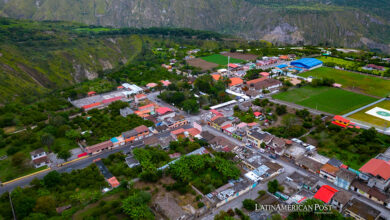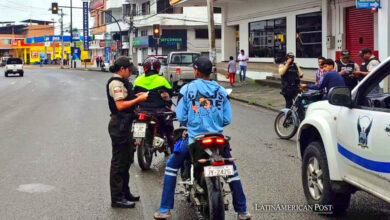González And Noboa Dispute An Election With A Shortened Period, But Transcendental For The Future
Today González and Noboa are competing for the presidency of a very short period in the presidency of Ecuador .

Photos: EFE/José Jácome
Fernando Arroyo León | EFE
Listen to this article
Leer en español: González y Noboa disputan una elección de periodo recortado, pero trascendental a futuro
Correísta Luisa González and businessman Daniel Noboa are competing today for the Presidency of Ecuador, in an exceptional election for a shortened period of just fifteen months in power, but which will be transcendental for the future of the country, which must overcome the crisis of governance that led to this situation.
González, bishop of former president Rafael Correa (2007-2017), and Noboa, heir to the business empire of his father, the banana sector magnate Álvaro Noboa, will go to an atypical electoral final after a period of political instability, social upheaval and insecurity, that has shaken the country in recent years.
Whoever wins these elections will only complete the four-year period (2021-2025) that corresponded to the current president, the conservative Guillermo Lasso , who shortened his mandate by invoking the so-called "crossed death" last May.
With this constitutional mechanism he forced these extraordinary elections by dissolving the National Assembly (Parliament), controlled by the opposition led by Correismo and which sought to remove him in a political trial where he was accused of alleged embezzlement (embezzlement), a charge that he categorically rejects. .
Lasso, who did not stand for re-election in these elections, blamed the Assembly for obstructing his policies in a chamber where the ruling party barely had representation and left the renewal of both powers in the hands of the voters.
Correismo, first force in Assembly
Thus, González and Noboa went to the electoral final after being the two candidates with the most votes in a first round where the new composition of the Assembly was also chosen, in which Correismo will once again be the first force but will not have an absolute majority. Therefore, whoever wins the presidential elections must generate pacts.
Of the 137 seats, Revolución Ciudadana, the movement led by Correa, obtained more than fifty.
A surprising second place was obtained by the Construye movement, whose presidential candidate was Fernando Villavicencio, murdered on August 9 while leaving a rally in Quito.
Construye would reach about 27 seats and would be followed by the conservative Social Christian Party (PSC), which has fifteen seats; and the National Democratic Action alliance (ADN), from Noboa, with just over a dozen assembly members.
Then minor groups appear such as Actuemos, by former presidential candidate Otto Sonnenholzner; Pachakutik, the political arm of the indigenous movement: Claro que se puede, by former presidential candidate Yaku Pérez; Reto, Centro Democrático, Amigo and other local groups, which would also add up when integrating majorities.
The six assembly members from abroad still need to be defined, whose votes will be repeated today after the problems registered with the "telematic voting" computer platform during the first round.
Margin of victory will be key
With this panorama, any of the two finalist candidates who manage to win in Sunday's election should analyze the political pacts to achieve an environment of governability, although it would be easier for González to go with the majority bloc in the National Assembly.
Noboa, somewhat more complicated, could direct his strategy to forming majorities with eventual allies such as Construye, who could play against Correism, for being openly critical of that trend.
For former legislator Ramiro Aguilar, the next legislature will be "super complicated", especially for Noboa, who could also try an alliance with the PSC, once a decisive legislative force, but which is now trying to heal from the wound of supporting the Lasso Government. .
For Aguilar, there are many possibilities that arise when analyzing the formation of the Assembly , but he stressed that governability will depend on the distance between González and Noboa that is reached in Sunday's election.
"If the result is tight," governability could have more difficulties , since it could force the ruler to make a series of pacts, some of which could be unpleasant; But if the scrutiny leaves a "loose" distance, this can play in favor of governability, said the Ecuadorian jurist.
Aguilar also said that the upcoming period will be one of transition because it is short, but he assured that it will be "fundamental for the future" because it will define which ideological trend will be positioned for the coming decades.




